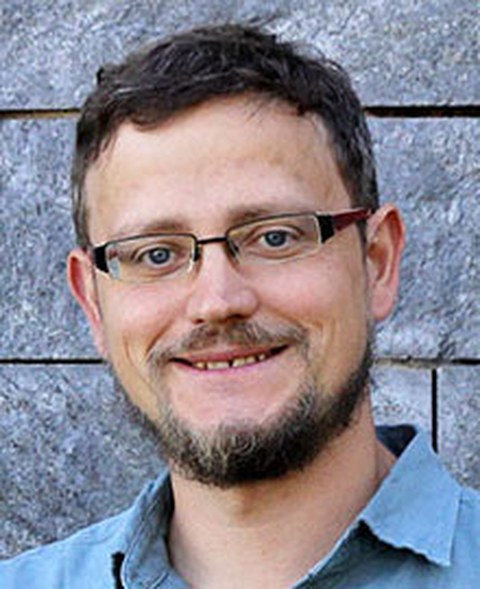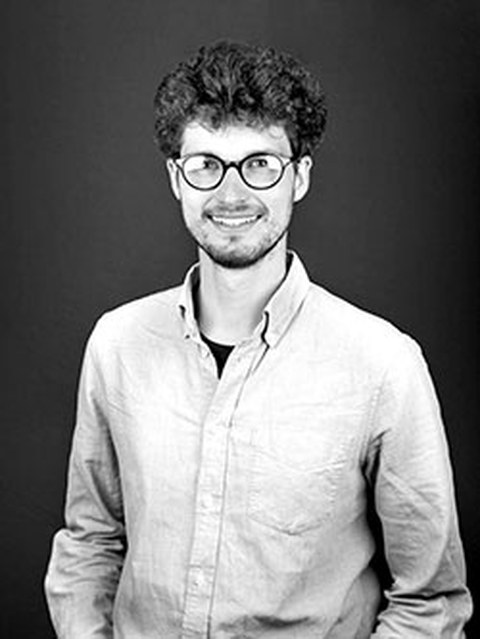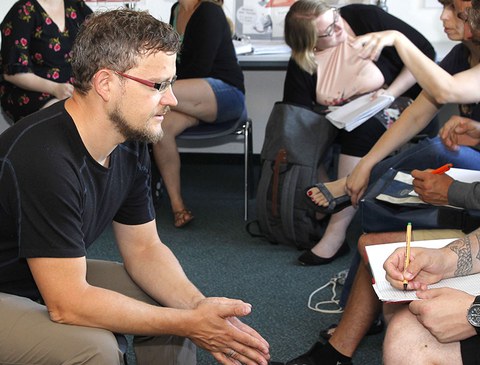From app developer to Teach First Deutschland fellow
(Interview from 2018)
Dagmar Möbius
Until a few months ago, Michael Schiefer programmed software for energy technology. The 36-year-old mechanical engineer was good at his job, but sometimes he felt the lack of a deeper meaning to his work. A birthday card from his mother changed everything.

Michael Schiefer has a degree in mechanical engineering. From August 2018, he will be spending two years working at a school in a difficult neighborhood.
High school, military service, degree. "All quite unspectacular," says Michael Schiefer, who was born in Freiberg and grew up in Dresden. From 2001 to 2007, Michael Schiefer studied mechanical engineering at TU Dresden, specializing in energy technology. "Math and physics were among my favorite subjects at school," he says, looking back. Then came his interest in technical equipment and processes. The degree program had a good reputation, and looked like it offered strong prospects on the job market.
The down-to-earth young man appreciates what he learned in various fields such as thermodynamics, heat transfer, and refrigeration and air conditioning technology "as helpful, and a strong foundation for my professional work." He remembers excellent lectures by Professor Karl-Heinz Modler in design theory, and by Professor Gustav Zouhar (†) in materials technology. "I got a lot out of those classes, not least an enthusiasm for the subject." Michael Schiefer found certain other lectures less inspiring: "Surely very few people are motivated by lecturers who simply read out their notes," he laughs. Fluid mechanics calculations are also not one of his fondest memories. When he started work, he developed the computer science, programming, project management, and teamwork skills that he did not learn at university. He worked first in a refrigeration and air-conditioning company and then spent nine years as an energy technology development and application engineer in software development. Michael Schiefer enjoyed the work. And yet, he did think sometimes about the significance of his job. "Customers do use the software for their projects, but I didn't have a direct involvement in the result."
He had gained experience in work with children and young people over many years in voluntary community roles in his free time. Summer camp, games, cooking, and hiking. Should he make the career switch – career jump – into teaching?

Tino Franzke is a psychology graduate, and responsible for staff selection and university marketing at Teach First Deutschland's Saxony office.
A birthday card from his mother changed everything. "I was immediately interested in the call for Teach First fellows who wanted to be part of a leadership program," Michael Schiefer says. The Saxony office of the non-profit organization, which was founded in 2008 and is already established in several German states, opened in early 2018. "Fellows work for two years at schools in socially deprived areas and support students in the classroom and in extracurricular projects," explains Tino Franzke, who is responsible for staff selection and university marketing at Teach First Deutschland in Saxony. "Applicants like Michael Schiefer are particularly valuable. He has a STEM degree as well as professional and life experience," says the psychologist, who earned his master's in clinical psychology and psychotherapy in 2017, also at TU Dresden, and found his current vocation after careers coaching.
For Michael Schiefer, a "bigger adventure on a not-so-exciting resume" began in June 2018. There are three months' preparation for his school assignment. Schiefer is currently completing a four-week summer academy in Oberhof, together with 90 future fellows from all over Germany, 19 of them from Saxony. They are learning the theory and the tools of the teaching trade and there are lots of small group exercises. There have been a number of "eureka" moments. "I started from scratch in terms of teaching and education," says the mechanical engineer. "Now I have a plan, I know how to set goals, and how to deal with children and young people. My personal learning curve has been very steep." Nevertheless, he still felt insecure in role-playing exercises. Not that his team members noticed. "They said I seemed confident and competent. That is a relief," says the Teach First fellow. He is currently also training in experiential education.
From the start of the 2018/19 school year, Michael Schiefer will be assigned to a Dresden elementary school for two years, probably in the Johannstadt district. Unlike a "real" teacher, he will not be awarding grades. Instead, he will provide supplementary instruction in small groups and perhaps lead clubs or launch projects in specific subjects. "I don't think I'll be starting a music club," he says with a smile, but there are many possibilities in the technical field. He doesn't want to take a decision on what comes after his assignment yet. "Maybe I'll stay in education, maybe I'll go back to industry." Whatever happens, Michael Schiefer is looking forward to his new job. "It's an exciting project where we can make a big difference. In particular to students who would otherwise fall through the cracks. I had a comfortable and sheltered childhood, and now I want to give something back."

The summer academy program is demanding. Work in small groups and role-play are all part of the schedule (Michael Schiefer is front left).
The fellows will work in Saxon elementary and high schools in and near Dresden and Chemnitz – and from the coming school year throughout the state of Saxony. They will help students at transition points in the education system. The main goals are to achieve the best possible school-leaving qualifications and to prevent school dropout. The Saxon Ministry of Education and Cultural Affairs (Kultusministerium) is financing the fellows system. Fellows are employed by Teach First Deutschland and receive an annual gross salary of at least 22,200 euros. The two-year leadership program also includes around 600 hours of professional development, workshops, training, and coaching worth 30,000 euros.
Contact:
Michael Schiefer
Teach First Fellow Sachsen
Email
Tino Franzke
Referent für Recruiting und Hochschulmarketing
Teach First Deutschland | Büro Sachsen
Email
